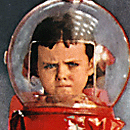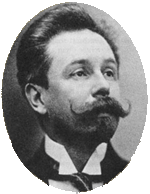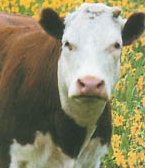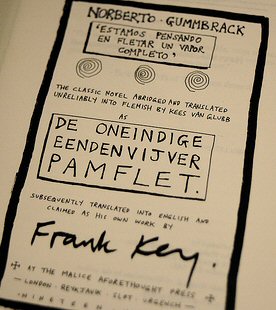Normal Hooting Yard service will be resumed in the very near future. Meanwhile, here is another episode of the exciting series Blodgett And His Pals Hanging Around On A Mysterious Island After Surviving A Plane Crash.
Flashback. A car drives up to a motel in the middle of nowhere. It is not as spooky-looking as the Bates Motel, but will something spooky occur? A woman seen from behind opens the boot of the car. It is full of lots of different number plates. She goes into her motel room and gets undressed for a shower. We still cannot see her face. In the shower, we see blonde dye running out of her hair. Aha! It's Marigold Chew.Next we see her going into a post office to collect a letter that's waiting for her. She reads it and begins to weep.
Now, Marigold Chew is sitting on the beach holding a toy aeroplane. Pabstus Tack joins her, strumming his guitar. He thinks that his band's record sales will increase because the world thinks he's dead. “When the helicopters come to rescue us, we'll be ridiculously and eternally famous!”
Blasphemous Ted Cargpan is a science teacher who understands meteorology. He explains that the raft cannot be launched because the monsoon season is about to descend upon them and the raft will be forced in the wrong direction. The last possible day to leave was yesterday. Old Halob says they will take a chance and leave tomorrow. Marigold Chew says she wants to go on the raft.
(During the advert break there is a warning about a new film that contains “emotional intensity”. Would that it were so.)
Old Halob says there are no spare places on the raft. Marigold Chew says she can sail and that fictional athlete Bobnit Tivol knows nothing about maritime matters.
Flashback. Marigold Chew is walking through a hospital corridor carrying a bouquet of flowers. She is heading for room 208. There is a police officer sitting outside one of the rooms and she passes him nervously. One of the hospital doctors is getting into his car in the garage. His name is Doctor Fang. Marigold Chew is sitting in his car. She tells Doctor Fang she has come to see her mother who is dying of cancer, and she needs Doctor Fang's help.
The Grunty Man is fishing. Tiny Enid says “Please talk to me”. “I am going on the raft,” grunts The Grunty Man.
Lothar Preen and Dobson are trudging through the forest. They meet up with Blodgett and go to the hatch.
Dobson : “What is this thing?”
Blodgett : “Exactly. It's time we talked about this.”
The Grunty Man is packing salted fish on to the raft. Old Halob asks fictional athlete Bobnit Tivol if he has any knowledge of maritime matters. “Are you voting me off?” shouts fictional athlete Bobnit Tivol. He heads off angrily to see Marigold Chew. He tells her he knows she is a fugitive from justice. “Your secret's safe with me but you're not getting my spot on the raft!”
Marigold Chew : “If I want your spot I'll get it”
Dennis Beerpint asks Old Halob if they will come back for everyone else once they are rescued. Old Halob says it might be hard to find the island again. Then he seizes up with stomach cramps. Dennis Beerpint runs off to find Dobson.
Blodgett says he has known about the hatch for three weeks. Dobson wonders how they can open it. Lothar Preen thinks it might be dangerous to open it. “Maybe it was never meant to be opened…. from outside!” he says, dramatically. Marigold Chew runs up to say there is something wrong with Old Halob. He is writhing on the ground. Dobson tends to him. Dennis Beerpint looks stricken.
Flashback. Marigold Chew with Doctor Fang. It's the middle of the night and they have three hours to kill. “Do you think it's still there?” says Marigold Chew. In the middle of nowhere, under a big tree, they take spades out of the boot of a car and start digging. There may be goats in the distance.
Blodgett and Dobson are talking about Old Halob. Dobson thinks there is something in his water. Old Halob says he feels better if he neither moves nor breathes. It seems someone has deliberately poisoned him. Blodgett says he had no idea Marigold Chew was a fugitive from justice. Much talk of who knows what and the use of discretion in the sharing of knowledge.
Pabstus Tack is playing his guitar to Minnie Crunlop's baby. He is happy to be writing songs again. He suggests Minnie Crunlop should come and hang out wth him after they're rescued. I think his new song is called “Monster Eats The Pilot”. Possibly.
Dobson asks Marigold Chew if she poisoned Old Halob.
Marigold Chew : “Do you think I'm capable of that?”
Dobson : “I don't know what you're capable of.”
Flashback. Still digging. Marigold Chew's spade goes clunk. She disinters a small box full of her and Doctor Fang's memorabilia. They sit in the car looking through it and listening to an old cassette recording, on which Doctor Fang says: “In twenty years we'll be married” to which Marigold Chew's reply is “As soon as I can drive I'll just run away”. They look at each other. Marigold Chew sobs. They kiss.
Blodgett and Dennis Beerpint. Blodgett is improvising a poultice for his leg, as he tends to do. Dennis Beerpint says he didn't poison Old Halob. Blodgett says he knows Dennis Beerpint is innocent, even if he did burn the raft first time round. Dennis Beerpint gets a weird look in his eyes and suddenly says “Don't open that thing! Don't open that thing!” He is not referring to the poultice, we surmise.
Old Halob tells fictional athlete Bobnit Tivol he can't come on the raft because he's a liar and a criminal and he tried to poison him. So fictional athlete Bobnit Tivol goes to Marigold Chew and manhandles her and tips her bag open, shaking the contents on to the beach in front of the assembled throng.. He picks up a passport Marigold Chew has stolen from a woman who drowned. Fictional athlete Bobnit Tivol says Marigold Chew cares about no one and nothing except herself.
Flashback. At the hospital, Marigold Chew is with her dying mother, holding her hand and sobbing. Trembling lower lip. There ought to have been a warning about “emotional intensity”. Marigold Chew's mother looks at her and then starts croaking “Help! Help!” to the hospital staff. Marigold Chew runs away. A policeman tries to stop her but she knocks him out. She runs to Doctor Fang's car and they screech away, but there are sirens and their path is blocked by a police car. She yells at Doctor Fang to get out of the car, but he won't, so she puts her foot down ready to ram her way to freedom. Oops. There are gunshots and she doesn't get very far before crashing. Doctor Fang dies in the crash, with the toy aeroplane from the memorabilia box on his lap. Uninjured, Marigold Chew runs away.
On the beach, fictional athlete Bobnit Tivol asks Marigold Chew why she wants to run away by usurping his place on the raft. Marigold Chew admits that she is a fugitive from justice but insists that she didn't poison Old Halob. Mrs Gubbins wanders past looking sulky. Everyone looks at Marigold Chew judgmentally and walks away from her, leaving her holding the toy aeroplane.
Tiny Enid and Dobson watch the finishing touches being put to the raft. Dobson says he knows that Tiny Enid was trying to poison The Grunty Man to stop him going, but the water bottles got mixed up. Tiny Enid says she only wanted to make him ill enough so he wouldn't be able to leave. Dobson says he won't tell anybody.
Marigold Chew and fictional athlete Bobnit Tivol exchange meaningful looks over the bonfire. Fictional athlete Bobnit Tivol tells her he's back on the crew of the raft despite knowing nothing of maritime matters.
Dennis Beerpint tells Old Halob he set fire to the first raft because he didn't want to leave.
Tiny Enid tells Marigold Chew that Dobson knows about the poison plot, but not that the whole thing was actually Marigold Chew's idea. Ah, such narrative complexity!











